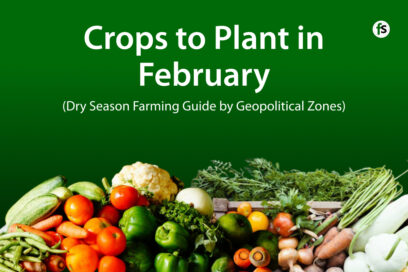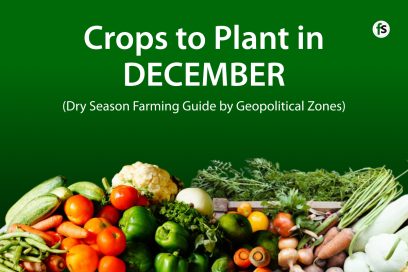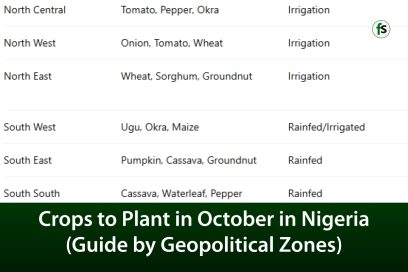Crops to Plant in November in Nigeria | Guide by Geopolitical Zones
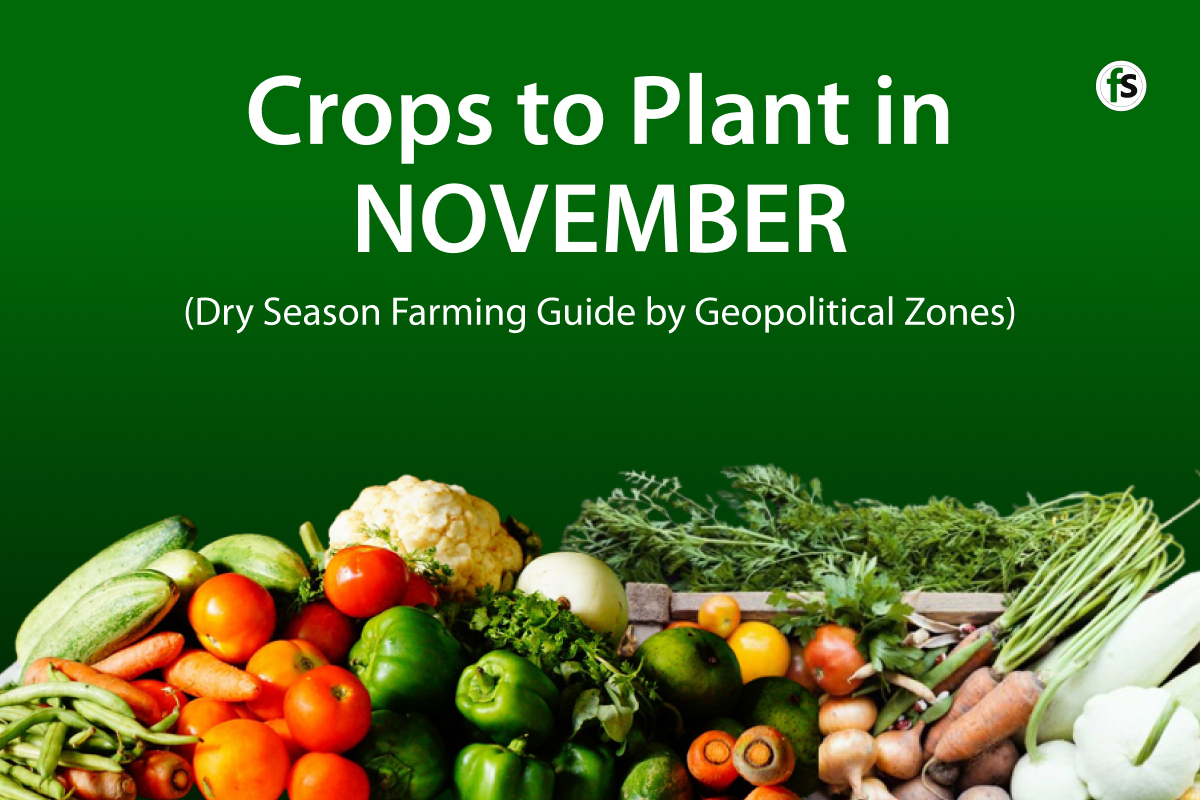
Crops to Plant in November in Nigeria – November is the gateway to Nigeria’s dry season farming period. A time when rainfall has largely ceased in most regions, and farmers now rely on irrigation and controlled water management.
For farmers who plan wisely, November is not the end of farming – it’s a new beginning. With proper irrigation, this month opens up opportunities for growing high-demand vegetables, grains, and legumes that sell at premium prices during the off-season.
In this comprehensive guide, we’ll explore:
- The best crops to plant in November across Nigeria’s six geopolitical zones.
- Weather conditions and soil tips for the dry season.
- Farmsquare recommendations on irrigation, seeds, and farm inputs to ensure maximum yield.
Understanding November Weather Patterns Across Nigeria
- Northern Nigeria:
Dry, sunny days with little or no rainfall. Humidity is low, but soil retains some moisture. Irrigation is crucial at this stage. - Southern Nigeria:
Rains have largely stopped, but the soil still holds enough moisture for short-season vegetables and legumes. Irrigation helps maintain steady crop growth.
Best Crops to Plant in November by Geopolitical Zones
1. North Central (Kogi, Kwara, Niger, Benue, Nasarawa, Plateau, FCT)
Ideal November Crops:
- Vegetables: Tomato, pepper, onion, okra, cabbage, lettuce
- Grains: Maize (irrigated), wheat
- Legumes: Cowpea, groundnut
- Fodder crops: Napier grass for livestock feed
Prepare nursery beds for vegetables using topsoil mixed with compost. Apply NPK 15:15:15 two weeks after transplanting and ensure steady irrigation.
Farmsquare Recommendations:
- Hybrid Tomato Seeds
- Irrigation Drip Kits
- Organic Fertilizers
2. North West (Kano, Kaduna, Katsina, Sokoto, Kebbi, Zamfara)
Ideal November Crops:
- Vegetables: Onion, tomato, cabbage, carrot, pepper
- Cereals: Wheat (main planting month)
- Fodder crops: Sorghum stover, millet for livestock
Wheat thrives when planted between November and early December. Use high-yield varieties such as LACRI W1 and maintain soil moisture through flood or drip irrigation.
Farmsquare Recommendations:
- Wheat Seeds
- Sprinkler Systems
- Crop Protection Chemicals
3. North East (Borno, Yobe, Bauchi, Gombe, Adamawa, Taraba)
Ideal November Crops:
- Cereals: Wheat, sorghum, millet
- Vegetables: Tomato, onion, pepper (under irrigation)
- Legumes: Groundnut, cowpea
Adopt greenhouse technology for tomato and pepper cultivation to protect crops from wind damage and maintain temperature control.
We Handpicked these for you:
– Crops to Plant in October in Nigeria
– 10 Essential Farm Inputs You Need
– Greenhouse Farming in Nigeria
Farmsquare Recommends:
- Greenhouse Structures
- Tomato Hybrid Seeds
- Water Pumps & Hoses
4. South West (Oyo, Osun, Ogun, Ondo, Ekiti, Lagos)
Ideal November Crops:
- Vegetables: Ugu, okra, pepper, cucumber, amaranthus
- Root crops: Cassava, sweet potato
- Legumes: Groundnut, soybean
Set up small-scale irrigation for vegetable beds using watering cans, drip lines, or hose pipes. Use compost or poultry manure to enrich your soil.
5. South East (Abia, Anambra, Ebonyi, Enugu, Imo)
Ideal November Crops:
- Vegetables: Pumpkin (ugu), waterleaf, pepper, okra
- Legumes: Groundnut, soybean
- Fruits: Pineapple, banana
- Root crops: Cassava (early dry season planting)
Farmers can establish irrigation with low-cost manual watering systems and mulch their crops to retain soil moisture.
6. South South (Akwa Ibom, Cross River, Bayelsa, Delta, Edo, Rivers)
Ideal November Crops:
- Vegetables: Okra, ugu, cucumber, pepper
- Root crops: Cassava, yam (for next season)
- Spices: Ginger, turmeric
- Fruits: Plantain, pineapple
Leverage the remaining soil moisture to start vegetables before full dry season. Install simple irrigation kits by late November to maintain crop growth.
Farmsquare Suggestions:
- Cucumber Seeds
- Pepper Hybrid Seeds
Key Farming Activities in November
- Soil Preparation:
Loosen the soil and mix with organic manure. Ensure proper drainage to prevent compaction. - Irrigation Setup:
November marks the start of irrigation farming — install drip or sprinkler systems early. - Seed Nursery Preparation:
Grow seedlings under shade before transplanting to open fields or greenhouses. - Pest & Disease Control:
Apply preventive fungicides and insecticides such as Z-Force or Agrovert. - Harvest Planning:
Harvest mature short-cycle crops planted in September–October while preparing new beds.
Why November Is Perfect for Profitable Farming
- Less competition: Most farmers stop after the rainy season.
- High market demand: Vegetables and grains fetch better prices in the dry season.
- Better crop quality: Controlled irrigation reduces disease incidence.
- Extended growing window: Ideal for greenhouse or irrigated vegetable farming.
Conclusion on Crops to Plant in November in Nigeria
Farming in November is for strategic and forward-thinking Nigerian farmers. While others take a break, you can dominate the market with fresh vegetables, grains, and legumes grown through irrigation or greenhouse farming. Whether you are in the North cultivating wheat, or in the South growing pepper and vegetables, Farmsquare is your trusted partner for all agricultural inputs.
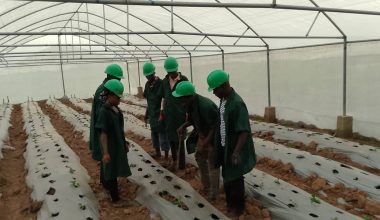 Greenhouses
Greenhouses